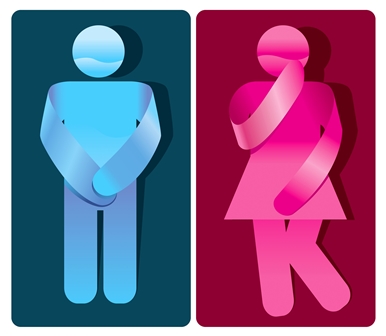Bowel incontinence means you lose control over passing stool, whereas urinary incontinence refers to a condition that involves unwanted passage of urine. When you have bowel or bladder dysfunction, you are likely to experience other problems as well with voluntary urination and bowel movements. Not only can these problems cause pain and discomfort, they can be a source of embarrassment as well. While you may not feel comfortable with the idea of seeking medical help, you should not waste time and talk to your healthcare provider to find a treatment option to deal with loss of bladder or bowel control.

Causes of Loss of Bladder and Bowel Control
Certain nerves in your body control those muscles that allow the bowel and bladder to function properly. These nerves allow muscles in the body to contract and relax properly, which is important for feces and urine to be eliminated from your body. The nerves in your spinal cord receive signals from the brain and send them to the sphincter and bladder muscles to control their movement. There are muscles in the anus and rectum that control your bowels, whereas sphincter muscles release and control stool. It means that problems with these nerves can lead to problems with bowel and bladder function.
Causes of Bowel Incontinence
Any damage to the muscles around the anus may lead to bowl incontinence. This damage could be the outcome of vaginal childbirth – this may also affect the nerves in this area. It is due to this particular reason that women are twice as likely to develop bowel incontinence as compared to men. Anal surgery may also damage the anal sphincters and nerves in this area.
Similarly, you may end up experiencing bowel incontinence after severe diarrhea, irritable bowel syndrome, or an infection. Inflammatory bowel disease, such as ulcerative colitis and Crohn's disease can also lead to bowel incontinence. Other common causes include radiation damage to the rectum and nerve damage caused by spinal cord injury, diabetes, and multiple sclerosis. Cognitive impairment is usually the result of a stroke or Alzheimer's disease and it can also make you lose control over bowel movement.
Causes of Urine Incontinence
It is not always necessary to have a noticeable cause of loss of bladder and bowel control, but your doctor can help you identify the best treatment in this case. Certain conditions can cause urinary incontinence. For instance, it may happen due to poor overall health, vaginal childbirth, and any damage to the nervous system.
Some people simply have an overactive bladder, which means they sometimes feel the urge to use the bathroom more than eight times a day. If that is the case, you are more likely to suffer from urinary incontinence. The muscles and nerves that control the bladder may become weak and fail to control urine flow. Moreover, it is possible to sustain nerve damage by resisting the urge to pass urine. Overtime, this makes the bladder muscles to become weak, which in turn leads to urinary incontinence. Urine retention can sometimes be the result of excessive scarring after urethral surgery.
What to Do About It
It is important to talk to your healthcare provider to determine the underlying cause of your problem. They will consider your symptoms and then help create a plan of action. Some of the treatment options for loss of bladder and bowel control may include the following:
 Diet Change: Your doctor may help overcome your problem by making changes to your diet. Usually, it is important to increase your fiber intake to manage constipation and diarrhea. Increasing your fluid intake may also help control constipation. Your doctor can also help you identify certain dietary triggers that lead to bladder dysfunction. Some common triggers include alcohol and coffee.
Diet Change: Your doctor may help overcome your problem by making changes to your diet. Usually, it is important to increase your fiber intake to manage constipation and diarrhea. Increasing your fluid intake may also help control constipation. Your doctor can also help you identify certain dietary triggers that lead to bladder dysfunction. Some common triggers include alcohol and coffee. Stay Active: You need to be active and exercise regularly. Your exercise program may include specific exercise such as Kegel exercises that help strengthen the pelvic floor and sphincter muscles. This helps you have more control over bladder and bowel muscles. Talk to your doctor about the right way of performing these exercises.
Stay Active: You need to be active and exercise regularly. Your exercise program may include specific exercise such as Kegel exercises that help strengthen the pelvic floor and sphincter muscles. This helps you have more control over bladder and bowel muscles. Talk to your doctor about the right way of performing these exercises. Take Medications: Your doctor may also prescribe fiber supplements and other anti-diarrheal medications to help control your diarrhea or constipation. Certain prescription medications prove effective against bladder dysfunction by helping bladder muscles to relax. Be sure to take these medications as directed by your doctor.
Take Medications: Your doctor may also prescribe fiber supplements and other anti-diarrheal medications to help control your diarrhea or constipation. Certain prescription medications prove effective against bladder dysfunction by helping bladder muscles to relax. Be sure to take these medications as directed by your doctor.- Training: Your doctor may recommend taking part in training programs that explain how to train your bladder and bowel muscles to manage dysfunction. This also includes setting a schedule for using the toilet. You are also encouraged to set a time and try to have bowel movements or urinate at the same time each day.
- Electrical Stimulation: You may have to undergo electrical stimulation to treat your damaged nerves. The therapy also helps promote better muscle control.
When other treatments do not produce desired results, you may consider undergoing surgery. Your doctor tries to repair any damage to the nerves and muscles to prevent loss of bladder and bowel control.
